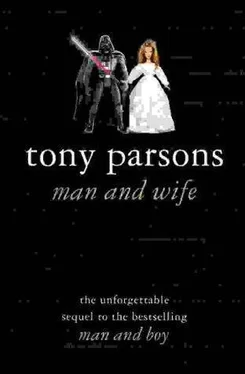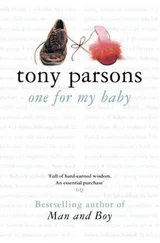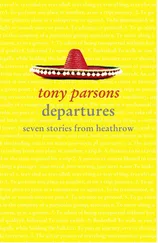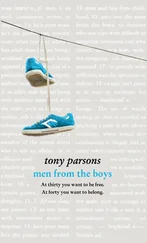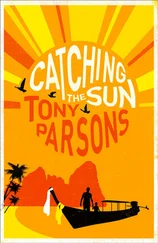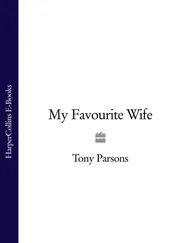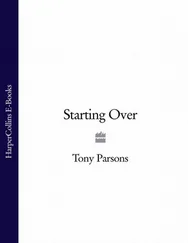’My dad’s okay.’ She smiled for the first time, wiping her nose with the back of her hand. ’He’s a silly old bugger. He put his hip out snowboarding.’
’Snowboarding? I thought there was something wrong with him.’
’Only the thing that’s been wrong with him all his life. He can’t grow up.’
I had slipped my shoes off at the door – even in these rented rooms, I didn’t need to be told that Gina liked you to take your shoes off at the door, Japanese style – and now I could feel my feet quivering with the vibrations coming through the floor. ’I’m going to go and talk to those morons.’ ’Don’t, Harry.’
’Don’t worry, they’re not going to hurt me. They’re all middle-class kiddies from safe, rich homes.’ ’Not like us, then.’ ’No, nothing like us.’
I looked at her. Despite her tiredness and the tears, and all the years, she had the same glow about her that had left me breathless and speechless the first time I ever saw her. But something had happened to Gina, something terrible.
’Go and look in on Pat, will you? I’ll make us some tea. Is jasmine okay? It’s all I’ve got.’ Jasmine’s fine.’
Gina went into the small kitchen and I tried a few doors until I saw the familiar tousle-haired figure sleeping flat on his back.
My son, at seven years of age, sleeping in the second bedroom of a rented flat in Belsize Park. While I lived a few miles away with another woman, another child. As always, I was shocked by the love I felt for my boy. The hip-hop from below was shaking his windows. He didn’t seem to care. I pulled his Phantom Menace duvet up over his shoulders and closed his door as quietly as I could.
Gina was placing two cups of pale-green tea on the coffee table.
’Sleeping,’ I said.
’He could sleep through anything, that kid. You should have seen him on the plane. Turbulence all the way across the Atlantic. Didn’t even stir.’
’What is it, Gina? What’s really wrong?’
’It’s Richard. I’ve left him.’
It took a moment for this to sink in. ’You’ve left Richard? So this trip to London -’
’Permanent. We’re not going back.’
’So when you said it was for a few weeks…”
’That was the original plan. But there’s no point in going back. Oh fuck, Harry, my life is such a mess. What am I doing in this bloody flat with these stupid students and their awful music? I’m going to end up on Jerry Springer, I swear I am.’
’You’re not going to end up on Jerry Springer. What happened?’
’Children.’
I thought she meant Pat. I thought she meant that her life didn’t fit with both Richard and Pat. But that wasn’t it.
’We couldn’t have any,’ she said. ’We tried and tried. I couldn’t get pregnant. And it broke us up, Harry. It just broke us up.’
I sipped my tea. Even though it was scalding hot. I didn’t know if I should be hearing this. I didn’t know if I wanted to.
’I think a marriage needs children, Harry. It’s hard enough to keep together even if you have a kid. Without them – I don’t know if it’s possible. We had all the tests. Richard and me. It was okay at first. We even laughed about it – him masturbating into a little plastic container, me with my legs up in the air getting prodded and probed. They couldn’t find anything. But there’s something wrong somewhere. In the end, it was too much of a strain. Maybe it would have been easier, maybe we could have stood it, if Pat wasn’t there. But it was hard for Richard. It’s hard loving someone else’s child when you can’t have one of your own.’
’So Richard blamed Pat?’
’I didn’t say that, Harry. But it’s such a thankless task, being a step-parent. I think in the end Richard felt he couldn’t win.’ She sighed. ’Then I saw his credit card bill. Flowers, hotel rooms, restaurants.’ She looked at me. ’Flowers I didn’t receive. Hotel rooms I had never stayed in. Restaurants I had only read about.’ ’Who was she?’
’A neighbour. Some bored housewife with three kids, funnily enough. No doubt it would have been some woman at work if he’d had a job. Because he’s still unemployed, he had to find what he was looking for in Safeway. She probably thought she was missing out on something too.’ ’He must be crazy. Cheating on you.’ That gave her a laugh. ’You did, Harry. You did.’ ’I’m sorry, Gina. Sorry about you and Richard. About you and me. About the students downstairs. About everything.’
’What happened to us, Harry? What happened to the boy and girl who were going to stay together forever?’
’I don’t know what happened. Time, I guess. Just time, Gina.’
’Don’t you ever wish that it could be like that again? That innocent? That straightforward?’
I finished my Japanese tea and stood up. I was ready to face the music.
’Now and then,’ I said.
My mother slept.
White with exhaustion and pumped full of painkillers and medicine to kill the sickness, oblivious to the echoing, malodorous life of the hospital going on all around her, she was tucked into bed in her own little post-operation room, an IV drip attached to a pale-blue vein in her hand, and she lay on her back and slept.
Sleeping at noon on a Sunday. Something she had never done in her life. If you could call it sleep, that drugged unconsciousness that was the aftermath of her operation.
I sat by her side, afraid to touch her.
Her kind face, her smallness, and the thought of the dressing on her wound under that hospital nightdress – these things tore at my heart, and made me hold my head and almost choke on all that was inside me.
There were no visitors, not yet, and the doctors and nurses had all gone away. They had cut off the breast with the tumour and they were confident that the operation had been a success.
They talked me through what happened next. Chemotherapy. Then radiotherapy. The chemotherapy would most likely cause my mother’s hair to fall out and make her sick to her stomach. The radiotherapy would feel itchy, sore, like bad sunburn. Before all of that, when she awoke, she would feel a pain in her arm, and pins and needles, and sickness, the sickness would never be far away now. The wound, the cut that had been made to remove the thing that was killing her, that would be sore and tender and tight for months.
The doctors told me something that my mother would never tell me. That she wouldn’t be able to wear a bra. Not yet. The wound was too fresh. It seemed as if everything about this illness was painstakingly designed to make my mother feel less like a woman.
When they had all gone, the optimistic doctors and the cheerful nurses, the affable oncologist and the genial surgeon and the easy-going anaesthetist, I cried for what my mother had gone through, and all that she still had to go through.
Even if she beat this thing, even if she lived.
’I love you so much,’ I whispered, telling her things that we would both have been too shy and embarrassed to hear if she was awake. ’You don’t deserve this, Mum. Not you. Not anyone.’
I sat there for hours. All that Sunday she didn’t wake up. It felt like the kind of sleep that would last for decades, like something from a fairy tale. By the time I left, the spring afternoon was fading behind the drawn curtains of that tiny room. It was only when I was looking for my car in the hospital’s vast parking lot that I remembered the appointment I had missed.
I liked the lights on Primrose Hill.
They were, and still are, those old kind of Victorian streetlamps. Tall and black with a chunky glass casing at the top. Those lamps look like throwbacks to some older, lost city, the London of Sherlock Holmes and Watson, peasouper fogs and tugs on the Thames.
Читать дальше
Конец ознакомительного отрывка
Купить книгу
